Collection
Date
Location
Type
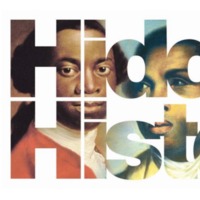
Hertfordshire's Hidden Histories
This partnership project, led by Hertfordshire Archives, investigated the links between Hertfordshire people, the slave trade and abolition through stories from original archival documents. Project outcomes included creative workshops, a booklist, a DVD documentary, a heritage trail booklet, and…
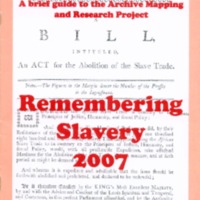
Remembering Slavery Archive and Mapping Project
Remembering Slavery 2007 involved museums, galleries and other cultural organisations across the North East of England in a programme of exhibitions, events, performances, lectures and activities to explore the themes of slavery and abolition, and identify connections with the region.
The…
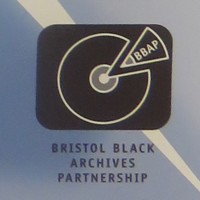
Bristol Black Archives Partnership
The Bristol Black Archives Partnership (BBAP) was set up to collect, protect and make available the heritage of Bristol's local black history. The partnership involved communities, heritage organisations and academic organisations coming together to collect and make accessible the archives - films,…
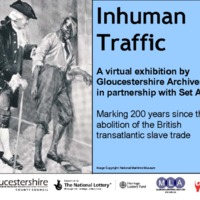
Inhuman Traffic
The Inhuman Traffic project was led by Gloucestershire Archives, in partnership with the Set All Free initiative. The virtual exhibition and accompanying web resource were based on documents held at Gloucestershire Archives and, in particular, the papers of the anti-slavery campaigner Granville…
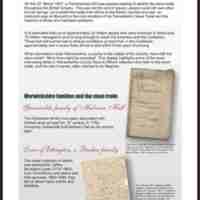
Slavery: A Warwickshire Connection?
An exhibition exploring the connections between Warwickshire and the transatlantic slave trade, using the collections held at Warwickshire Record Office. Several Warwickshire families owned plantations in the Caribbean, such as the Greatheed family of Guy's Cliffe who owned an estate in St Kitts.…
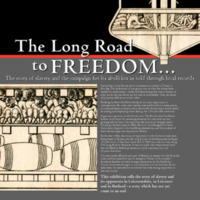
The Long Road to Freedom
As made clear by The Long Road to Freedom exhibition in 2007, the Record Office for Leicestershire, Leicester & Rutland contains a significant collection of documents which reveal local connections with the slave trade, and with those who campaigned for abolition. Several prominent local families…
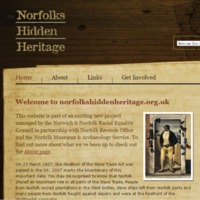
Norfolk's Hidden Heritage
Norfolk’s Hidden Heritage was a partnership project between the Norwich and Norfolk Racial Equality Council (NNREC), the Norfolk Record Office (NRO) and the Norfolk Museums and Archaeology Service (NMAS) which researched the links between Norfolk and transatlantic slavery. For example, many…
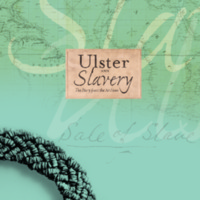
Hidden Connections: Ulster and Slavery 1807-2007
The Hidden Connections exhibition was a result of partnership between the Public Record Office of Northern Ireland (PRONI) and the Linen Hall Library in Belfast. The exhibition explored Ulster's links with slavery after 1807 via people, events and places, and looked at both the pro and anti-slavery…
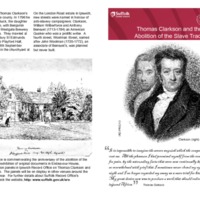
Thomas Clarkson and the Abolition of the Slave Trade
The county of Suffolk has many connections with the abolitionist Thomas Clarkson. He married in Bury St Edmunds and lived the later years of his life at Playford Hall near Ipswich. Suffolk Record Office commemorated the bicentenary with an exhibition of original documents and exhibition panels about…
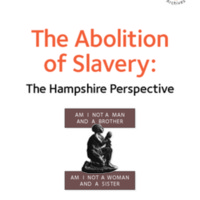
The Abolition of Slavery: The Hampshire Perspective
A touring exhibition exploring Hampshire's links with slave ownership and the abolition campaign was produced by (and featured material from) Hampshire Museums and Archives Service and Hampshire Record Office. The exhibition was on show in the Record Office foyer, before travelling to museums,…
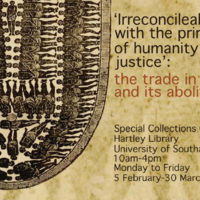
'Irreconcilable with the principles of justice and humanity': the trade in slaves and its abolition
An exhibition held in the Special Collections Gallery at the Hartley Library, University of Southampton. The exhibition took a broad view of the subject of transatlantic slavery across the 18th and 19th centuries, featuring accounts of the horrors of the transatlantic slave trade, the case for…
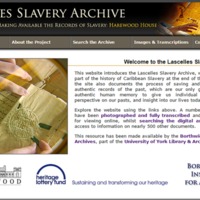
Lascelles Slavery Archive
The Lascelles Slavery Archive was a collaborative project between the Borthwick Institute for Archives and Harewood House Trust to conserve, preserve and make available records relating to slavery from the archives of the Lascelles family of Harewood House, Yorkshire. The project deals with a new…
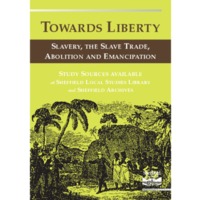
Towards Liberty: Slavery, the Slave Trade, Abolition and Emancipation
This booklet was produced to mark the bicentenary in 2007 and to highlight the material available in Sheffield Local Studies Library and Sheffield Archives for the study of slavery, the slave trade, abolition movements and emancipation. It looks, in particular, at the role of the city of Sheffield…
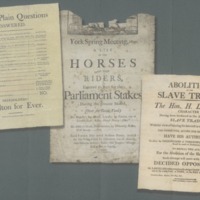
Harewood 1807
2007 saw a number of different projects taking place at Harewood House in West Yorkshire, home of the Lascelles family. The bicentenary was used as an opportunity to explore the family connections with the transatlantic slave trade and the sugar plantations of the West Indies.
As part of a newly…
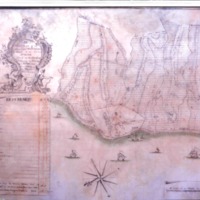
From Slavery to Freedom: Grenada to Paxton
Paxton House in Berwickshire was once owned by Ninian Home, the owner of two sugar plantations on the island of Grenada. The Wedderburn Papers, part of the house archives, contain some 2,000 documents relating to the Grenada properties between the 1760s and the 1840s. In 2007, the Paxton Trust began…
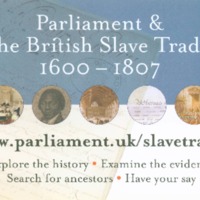
The British Slave Trade: Abolition, Parliament and People
This exhibition in Westminster Hall told the story of the pressures and events, at home and abroad, which influenced Parliament's abolition of the British slave trade in 1807. The Act itself was displayed alongside petitions sent to Parliament by the public. Also on display was Thomas Clarkson's…
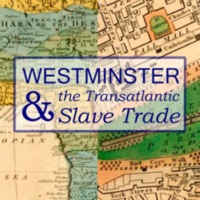
Westminster and the Transatlantic Slave Trade
An exhibition by the City of Westminster Archives Centre focused on the impact of the transatlantic slave trade and its abolition in Westminster, which drew on the Centre's archives and local studies collections. Links explored included the parish of St Anne's Westminster with St John's Antigua, and…
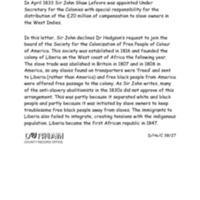
Exhibition to mark the bicentenary of the 1807 Act
Durham Record Office held an exhibition of its original documents relating to slavery, the slave trade and abolition. These include reports, maps, and a number of letters, from, for example, Sir John Shaw Lefevre (Under Secretary for the Colonies in 1833), the abolitionist James Stephen and the…